For many – okay, fine, all – the best part of starting a new RPG is always the character creation process. And The Outer Worlds fails to disappoint in this regard, with its finely crafted array of attributes and skills that you can use to start carving out the path of your character before you even set foot on Halcyon. Our The Outer Worlds skills & attributes guide will help you make the choices you truly want to make right off the bat, with detailed explanations of how each skill is used in-game, and how levelling up your skills actually works in The Outer Worlds.
The Outer Worlds skills & character creation guide
- The Outer Worlds character creation: attributes and skills explained
- Melee skills (1-Handed Melee, 2-Handed Melee)
- Ranged skills (Handguns, Long Guns, Heavy Weapons)
- Defence skills (Dodge, Block)
- Dialog skills (Persuade, Lie, Intimidate)
- Stealth skills (Sneak, Hack, Lockpick)
- Tech skills (Medical, Engineering, Science)
- Leadership skills (Inspiration, Determination)

The very first decision to make when starting a new game and creating a new The Outer Worlds character is to set the leaning of your attributes and your skills. Both these mechanics are interconnected, and it’s fairly important (especially with attributes) that you get it right first time. Here’s what you need to know about skills and attributes in The Outer Worlds:
- There are six attributes in The Outer Worlds, split across three categories: Body (Strength and Dexterity), Mind (Intelligence and Perception), and Personality (Charm and Temperament).
- Each of the six attributes begin on “Average“, and can either be pushed down to “Below Average“, gaining you a skill point to use elsewhere, or pushed upwards to “Good“, “High“, and “Very High“.
- You only have a total of six skill points to spend across the attributes, and each one affects the base starting values of various skills (which you can see when you hover over each attribute). They also give you an extra negative or positive effect if altered from “Average”. For example, increasing Temperament will increase your HP Regen, but setting it to “Below Average” will disable natural HP Regen and force you to rest or use consumables to heal.
- After modifying your attribute values, you must choose two out of your seven skill types to level up, providing a +10 bonus for each of the skills in those types. We’ll go over each skill type and skill below.
- Each skill has certain threshold bonuses which activate every 20 points. At 20 Dodge, for example, you’ll gain the ability to Leap. At 40 Dodge, your dodge recovery speed is doubled. And so on. Many things can affect your base skill values in The Outer Worlds, such as travelling with a certain companion or using a particular consumable – but only the base value is taken into account when unlocking these threshold bonuses, and once unlocked you’ll always have access to them even if you drop below that threshold afterwards.
- You earn 10 skill points each time you level up, and you can invest them in any of the seven skill types to increase the values of each skill of that type – but once a skill hits 50, you can only level it further by investing directly into that one skill, rather than the skill type.
The main thing is to read everything very carefully. Hovering over each attribute and each skill will give you a good idea of what each one actually does. Invest some points into a skill as a test, and see what changes before undoing it. Experimentation is key.
But! If you’re a min/maxer at heart, then we’ve got a special tip for you, thanks very much to RPS commenter “ScottFrazer” who let us in on the secret: when applying your initial points to your six attributes, it’s best to choose two attributes in particular and apply three points each to those, leaving the rest at Average. This gives you 252 points total into skills, whereas if you were to set every attribute to “Good”, then you’ll only receive a net of 216 points. So building tall on a couple of attributes give you more than building wide by spreading your points across all six.
Now, enough dilly-dallying! Let’s go over each of The Outer Worlds’ skills in more detail.
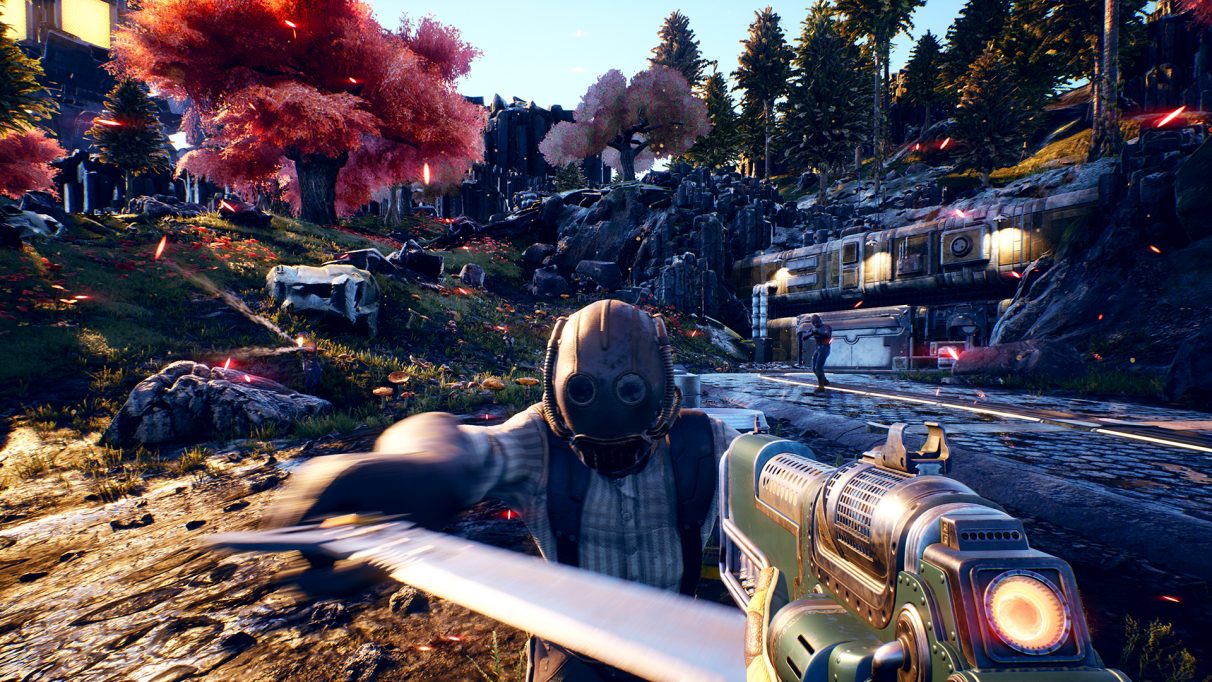
Melee combat is a very viable path for your character to specialise in if you like getting up close and personal with enemies – bearing in mind that many of them will be armed themselves, so you’ll want to make good use of your TTD (Tactical Time Dilation) ability to avoid their attacks and close the distance quickly. There are two types of melee weapon in The Outer Worlds: one-handed, and two-handed. Melee skills are therefore similarly easy to wrap your head around.
| 1-Handed Melee – Increases crit chance with 1-handed melee weapons. |
| 20 Points: Unlock Power and Sweep Attacks. |
| 40 Points: Unlock TTD Location Hit Effects. |
| 60 Points: 1-Handed Melee Weapon Reach +30%. |
| 80 Points: 1-Handed Melee Weapon TTD Drain -50%. |
| 100 Points: Power and Sweep Attack Chance to Stun +25%. |
| 2-Handed Melee – Increases crit chance with 2-handed melee weapons. |
| 20 Points: Unlock Power and Sweep Attacks. |
| 40 Points: Unlock TTD Location Hit Effects. |
| 60 Points: 2-Handed Melee Weapon attacks are Unblockable. |
| 80 Points: 2-Handed Melee Weapon TTD Drain -50%. |
| 100 Points: Power and Sweep Attack Chance to Knockdown +25%. |
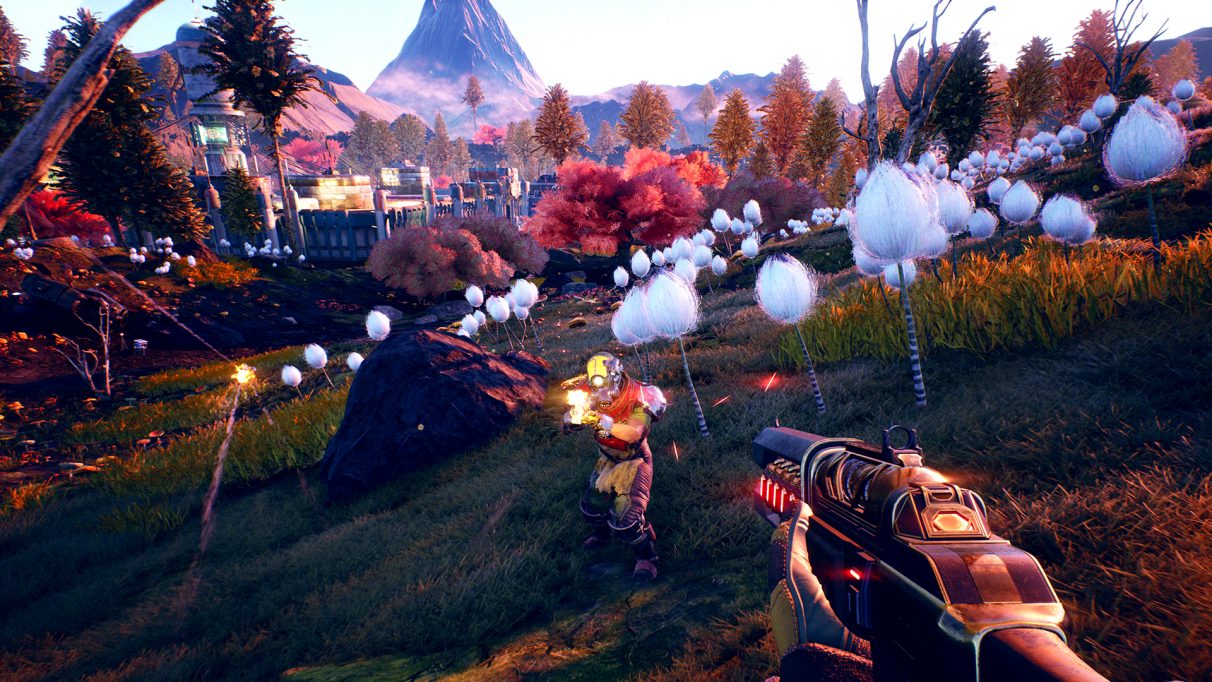
Ranged skills again are very easy to understand, as each of the three skills in this category help you to specialise in a specific weapon type, providing you not only with increased crit chance and decreased weapon sway but also some very nice threshold unlock benefits.
| Handguns – Increases crit chance and decreases sway when using Handguns. |
| 20 Points: Unlock TTD Location Hit Effects. |
| 40 Points: Handgun Critical Damage +50%. |
| 60 Points: Minimum Armor Penetration Damage +10%. |
| 80 Points: Debuffed Enemy Critical Chance +20%. |
| 100 Points: Handgun Critical Hits ignore 100% Armor. |
| Long Guns – Increases crit chance and decreases sway when using Long Guns. |
| 20 Points: Unlock TTD Location Hit Effects. |
| 40 Points: Long Guns Critical Damage +50%. |
| 60 Points: Long Guns Headshot / Weakspot Damage +20%. |
| 80 Points: Deadly Focus: No Weapon Sway for 5s after each kill. |
| 100 Points: Long Gun Critical Hits ignore 100% Armor. |
| Heavy Weapons – Increases crit chance and decreases sway when using Heavy Weapons. |
| 20 Points: Unlock TTD Location Hit Effects. |
| 40 Points: Heavy Weapons Critical Damage +50%. |
| 60 Points: Heavy Weapons Reload Speed +30%. |
| 80 Points: Heavy Weapon Frenzy: Critical Hits increase Rate of Fire +30% for 3s. |
| 100 Points: Heavy Weapon Critical Hits ignore 100% Armor. |

Defence skills comprise both dodging and blocking. Blocking is only relevant for melee fighters (but is near-essential for those specialising in melee), while dodging is useful for everyone. Take a look at the skills and threshold bonuses below to see how they useful they can be if levelled up.
| Dodge – Increases Dodge distance and reduces harmful Status Effect durations. |
| 20 Points: Unlock the ability to Leap (dodge forward). |
| 40 Points: Dodge Recovery Speed +100%. |
| 60 Points: Dodge Protection: +30% Armor Rating for 5s after every Dodge. |
| 80 Points: Dodge Force: After Dodging, your next Melee Attack gains +50% Damage. |
| 100 Points: Dodge Penetration: After Dodging, your next Weak Spot hit within 5s has a 50% Chance to Ignore Armor. |
| Block – increases Armor Rating when using a Melee Weapon. |
| 20 Points: Perfect Block: Block just before you get hit to Stagger your attacker. |
| 40 Points: Weapon Durability Loss from Blocking -25%. |
| 60 Points: Walk Speed while Blocking +100%. |
| 80 Points: No Weapon Durability Loss on a Perfect Block. |
| 100 Points: Perfect Blocks weaken opponents, increasing the damage they take by +100% for 5s. |
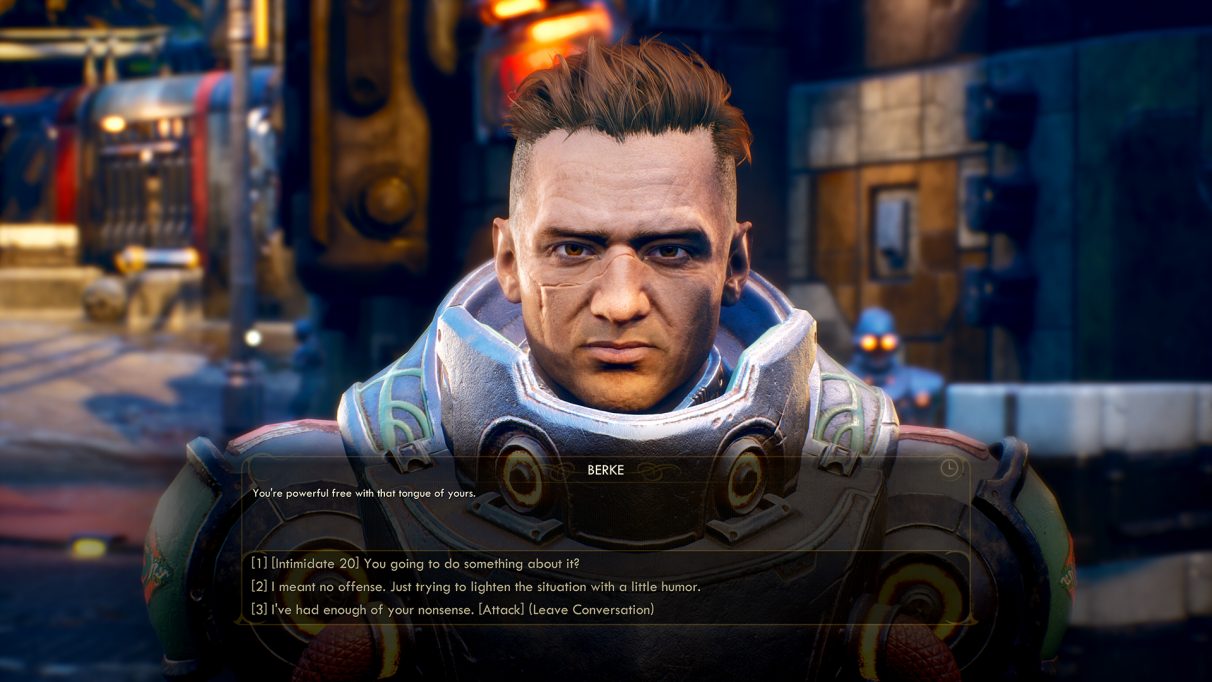
If you’re anything like me, you’ll invest heavily in the Dialog skills before any other skill type. This is the skillset that unlocks most of the more interesting dialog options throughout the game, giving you the ability to charm or intimidate your way into and out of certain situations. But they also each have a noted use in combat thanks to their threshold bonuses.
| Persuade – used to unlock hidden dialog options in conversations. |
| 20 Points: Cower: Humans have a 20% chance to cower in fear for 3s after the first time you hit them. |
| 40 Points: Cower Duration +7s. |
| 60 Points: Cowered Target’s Armor -50%. |
| 80 Points: Human Cower Chance +10%. |
| 100 Points: When a Human cowers, you gain +25% Armor for 10s. |
| Lie – used to unlock hidden dialog options in conversations. |
| 20 Points: Scramble: 15% chance Automechanicals will slowly attack other enemies instead of you for 10s. |
| 40 Points: Scramble Duration +7s. |
| 60 Points: Scrambled Automechanicals attack at their normal speed. |
| 80 Points: Automechanical Scramble Chance +10%. |
| 100 Points: Scrambled Automechanical Weakspot Damage +30%. |
| Intimidate – used to unlock hidden dialog options in conversations. |
| 20 Points: Terrify: 20% chance Creatures will become Terrified and flee for 10s after you kill one. |
| 40 Points: Terrify’s Area of Effect +100%. |
| 60 Points: Terrified Creature Movement Speed -30%. |
| 80 Points: Creature Terrify Chance +10%. |
| 100 Points: Terrifying a Creature gives 10s Crit Chance +5% and Critical Damage +25%. |
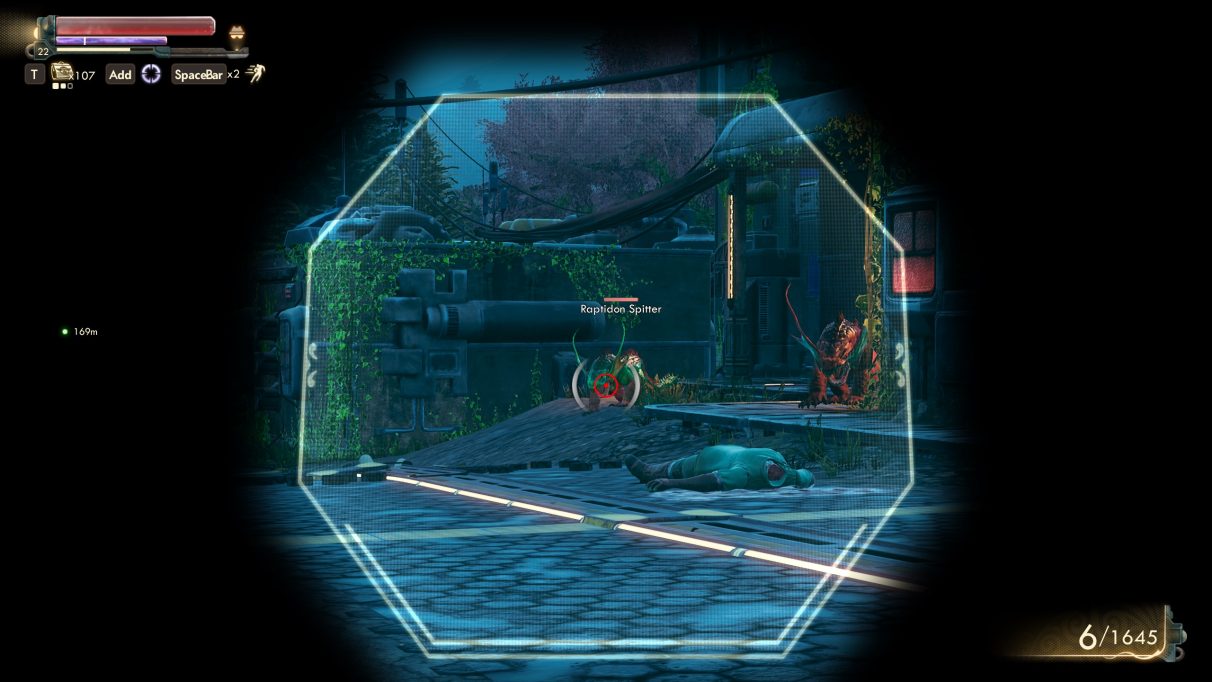
If the Dialog skills are ideal for extracting everything you want from the game’s conversations and NPCs, then the Stealth skills are ideal for doing the same to the game world. Sneaking, Hacking, and Lockpicking each come up very often throughout your journey across The Outer Worlds, so to avoid frustration and missed opportunities it might be a good idea to invest in this type from the outset.
| Sneak – Reduces detection range while crouched, increases NPC awareness decay, and increases Sneak Attack DMG. |
| 20 Points: Sneak Attack: Attack unaware enemies while crouched to deal bonus damage. |
| 40 Points: Pickpocket: Steal from humans while sneaking. |
| 60 Points: Crouch Move Speed +25%. |
| 80 Points: Sneak Attack Weakspot Damage +20%. |
| 100 Points: Sneak Attacks ignore +50% of the target’s Armor. |
| Hack – reduces hacking time and number of Bypass Shunts required for hacking. |
| 20 Points: Unlock the ability to sell goods to Vending Machines. |
| 40 Points: Unlock access to Restricted Items in Vending Machines. |
| 60 Points: Hack Automechanicals: Turn them off for 3s. |
| 80 Points: Automechanical Detection Range -30%. |
| 100 Points: Hack Automechanical Distance +2.5m (5m). |
| Lockpick – Reduces the unlock time and number of Magpicks needed for picking locks. |
| 20 Points: Doors and Containers requiring 1 Mag-Pick to unlock are free to open. |
| 40 Points: Find +25% more Bits in containers. |
| 60 Points: Lockpick Preview: See what is inside locked containers. |
| 80 Points: Lockpicking speed is increased to be nearly instant. |
| 100 Points: Find Pristine Item Chance +100%. |
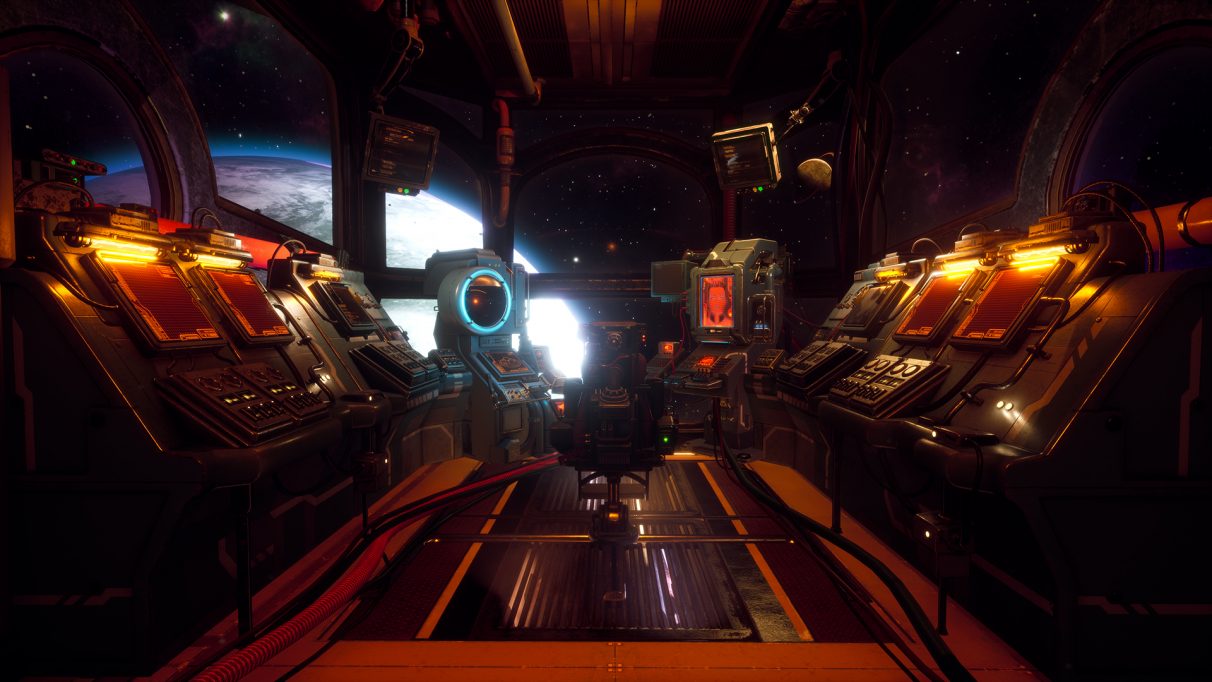
In my opinion it is extremely important to get to at least 20 in your Tech skills, because of the unlocks that follow. After that, deciding whether to upgrade them further is less of a necessity and more about how you want to build your character, but that first unlock repays itself a hundred-fold.
| Medical – increases Heal Amount granted by Inhaler and increases duration of Inhaler effects. |
| 20 Points: Unlock the 2nd Drug Mixing Slot for the Inhaler. |
| 40 Points: Unlock the 3rd Drug Mixing Slot for the Inhaler. |
| 60 Points: Hostile Effect Duration on Targets +50%. |
| 80 Points: Unlock the 4th Drug Mixing Slot for the Inhaler. |
| 100 Points: Damage Bonus vs Humans +20%. |
| Science – increases damage of Plasma and Shock damage weapons. Also improves special effects of Science Weapons. |
| 20 Points: Tinker: Improve your weapons and armor in the Workbench. |
| 40 Points: Tinkering Cost -50%. |
| 60 Points: Corrosion Damage +25%; N-ray Damage +25%. |
| 80 Points: Tinkering cost for Science Weapons is capped. |
| 100 Points: Further Reduce Tinkering Cost to -90%. |
| Engineering – reduces Armor Parts and Weapon Parts needed to repair your equipment. |
| 20 Points: Field Repair: Repair Weapons and Armor in the Inventory. |
| 40 Points: Break Down weapons and armor for a 20% Chance to extract a Basic Mod. |
| 60 Points: 20% Chance items you Repair will become Pristine, increasing Value and Durability. |
| 80 Points: Break Down weapons and armor for a 10% Chance to extract a Rare Mod. |
| 100 Points: Damage vs Automechanicals +20%. |

Finally, we have the Leadership skills of Inspiration and Determination, which affect the usefulness of the companion(s) you can choose to accompany you. Specifically in combat. Don’t knock it until you’ve tried it: making good use of your companions in The Outer Worlds can be instrumental in keeping yourself alive, particularly at the higher difficulties.
| Inspiration – increases the damage inflicted by your companions. |
| 20 Points: Companion Abilities: You can order Companions to do special attacks. |
| 40 Points: Companions gain +20% Armor Rating. |
| 60 Points: Companion Skill Bonus to Player Skills +100%. |
| 80 Points: Inspired Precision: When Companions kill an enemy, the part gains +20% Critical Hit Chance for 5s. |
| 100 Points: When Companions kill an enemy, All Companion Ability Cooldowns -20%. |
| Determination – increases the maximum health of your companions. |
| 20 Points: The Inhaler heals you and your companions, but they get 30% of the healing effect. |
| 40 Points: Companion Critical Damage +25%. |
| 60 Points: Companions get an additional 25% of the Inhaler’s healing effect. |
| 80 Points: Resolve: If a Companion is downed, party gains +50% Armor Rating and +50% Damage for 10s. |
| 100 Points: When Companions kill an enemy, they gain 50% Health. |
And there you have it! We’ve now covered each of the skills in The Outer Worlds in hopefully enough detail to give you an idea of how you might want to play your first character. But if you’re still unsure, don’t worry! I changed my mind about the focus of my first character half a dozen times throughout the game before settling on a single idea. This is a game that rewards experimentation and tactics, and cares less about min-maxing than about you having a great time.
